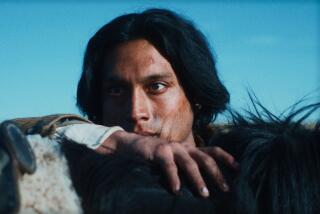Documentary desanitizes Portugal’s past
- Share via
LISBON — The heads of enemy soldiers impaled on roadside trees. Hundreds of prisoners tortured, killed and dumped in mass graves. Napalm dropped on jungles where guerrillas sheltered, and grass-hut villages torched with cigarette lighters.
These gruesome acts were carried out in Portugal’s name two generations ago during its colonial wars in Africa. But for most Portuguese, the events aren’t history -- they’re news.
A groundbreaking series aired by public broadcaster Radiotelevisao Portuguesa is confronting Portugal with unsettling aspects of its recent history that for decades have been shrouded in silence. The series has become a top-rated prime-time program and the most-watched documentary in years, regularly drawing more than 1 million viewers in a country of 10.6 million.
“People had spoken very little about what happened,” said Joaquim Furtado, the Portuguese journalist who created the series. “The effect, I think, has been positive. People won’t be able to see things in simplistic terms now.”
Portugal isn’t the only European country being forced to address unpalatable aspects of its colonial legacy.
Three years ago, Belgium was shocked by a documentary portraying King Leopold II’s brutal 19th century exploitation of what was once the Belgian Congo.
In 2002, France had to revisit one of the darkest moments of its recent past when a Paris court convicted an aging French general for “complicity in justifying war crimes,” in connection with his bestselling book about atrocities during a seven-year war that ended with Algeria’s independence in 1962.
Portugal’s wars against independence fighters in its 500-year-old African empire erupted in 1961 in Angola. In surprise attacks, rebels butchered Portuguese settlers, including women and children, on remote Angolan plantations. In revenge, Portuguese militias and troops carried out a vicious campaign of repression, despite pressure from the United States and United Nations to pull out of Africa.
Filmmaker Furtado, a well-known journalist with an almost 40-year career, spent more than six years digging up hundreds of hours of film footage and masses of photographs, some never seen in public. He also gathered accounts from war veterans on both sides, many of whom hadn’t spoken out before.
In the former Portuguese colony of Mozambique, the documentary has been greeted with quiet satisfaction but no calls for an official apology or compensation.
“No one is going to react angrily to the film because it shows the past, not the present. The past is the past, the present is the present,” said Custodio Rafael, a journalist with Radio Mozambique.
For Africans, the Portuguese atrocities have long been a matter of historical fact. But in Portugal, it has taken this documentary to explode the nation’s myths about its colonial rule, which ended in 1974.
Antonio Salazar’s dictatorship, established in the 1930s, kept Portugal in the dark about what was happening thousands of miles away on another continent. His censors killed unfavorable newspaper articles, and state media encouraged the war effort with reports of heroic deeds against insurgents.
Within a year, the Angolan rebellion subsided. But parallel wars broke out in Mozambique and another Portuguese African colony, Guinea-Bissau.
Salazar, mindful that the African colonies enriched his nation and lent it a Cold War stature beyond its size, waged a propaganda battle that included the unremitting government slogan “Angola e nossa!” -- Angola is ours! -- that was even broadcast over loudspeakers at packed beaches.
Salazar, a flinty and unbending leader, changed the designation of the colonies to “overseas territories” and depicted their peoples as Portuguese who were treated as equals and were eager to remain under Lisbon’s wing.
Ask Portuguese today about their colonial administration and they will insist it was benign, so radio phone-in shows are abuzz over the newly revealed facts.
Luis Quintais, an anthropologist at Portugal’s Coimbra University who has written a book about the African conflicts, says they have “been immersed in a huge silence,” while Portuguese history is rendered as the chronicle of a small, gentle country bullied by bigger European powers.
“We think of our colonization as having been soft, or mild, compared to other countries. But it wasn’t, it was just the same,” Quintais said. “We like to portray ourselves as victims, not victimizers.”
--
AP Writer Emmanuel Camillo contributed to this report from Maputo, Mozambique.
More to Read
Sign up for Essential California
The most important California stories and recommendations in your inbox every morning.
You may occasionally receive promotional content from the Los Angeles Times.













